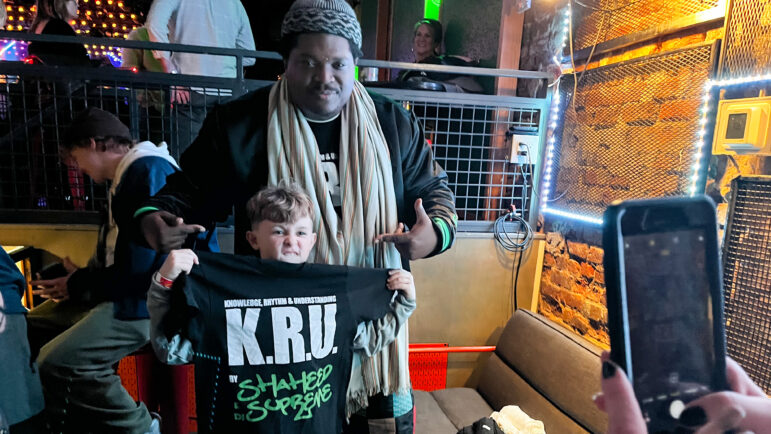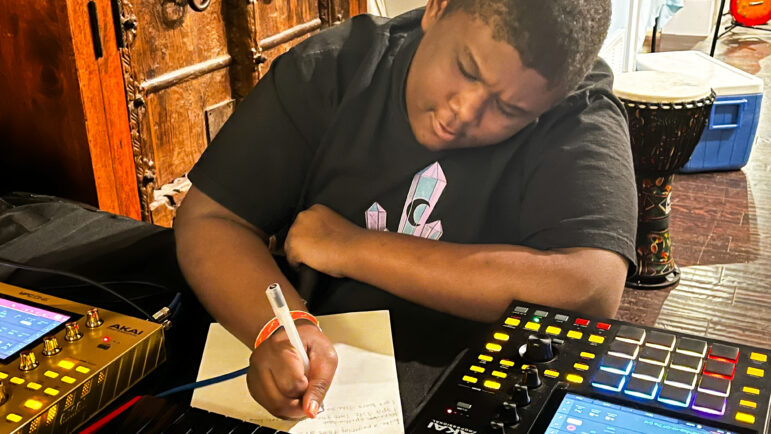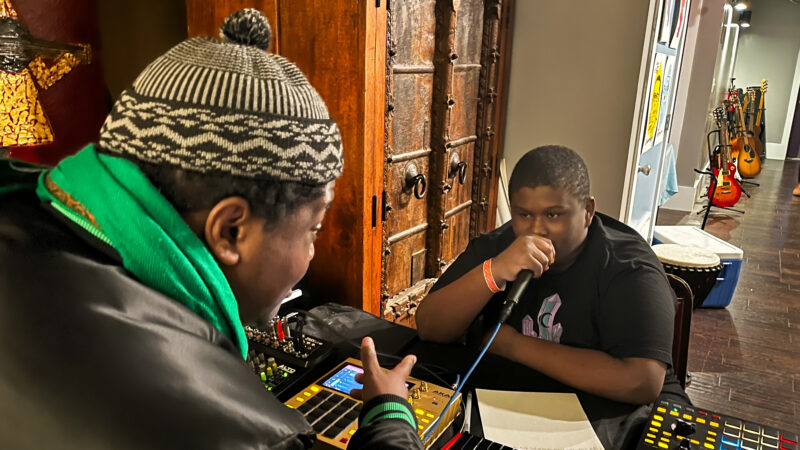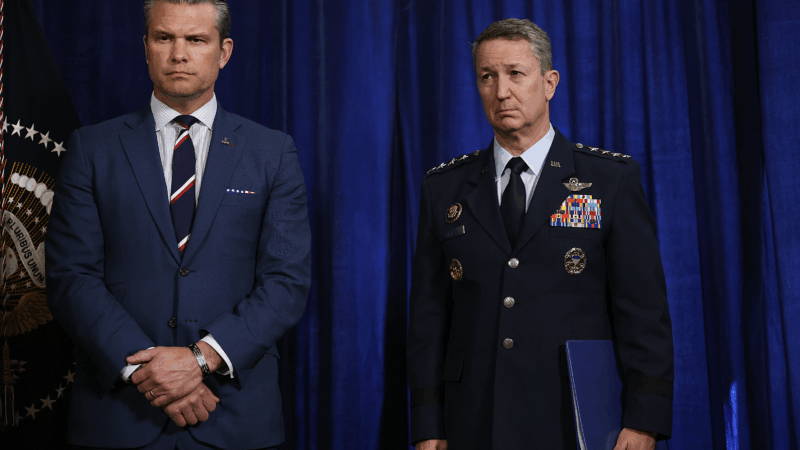A local hip-hop education group teaches kids life skills
On a drizzly December night, people were jam-packed shoulder to shoulder at Saturn in Avondale. The music was booming and the crowd cheered as a handful of kids took the stage. It was a showcase for students at the Firehouse Community Arts Center and a special night for the kids in Knowledge Rhythm and Understanding, or K.R.U. For a lot of the young performers, it was their first time on stage.
Two teens approached the microphone looking a little nervous, but when the beat came in, smiles spread across their faces. One was Taylor Cunningham, 15, who said the lyrics he writes at K.R.U. are his life.
“I spread laughter and love ‘cause I do not hate/ I may be big but you should look past that/ ‘cause you might find out I’m a real cool cat/ When I play the keys is when I’m feeling my best/ ‘cause when I’m at home I never get no rest,” he rapped into the microphone.
K.R.U. is a weekly class for young people in Birmingham that teaches life skills through hip-hop. Every week, a group of students are offered workshops centering on the four pillars of hip-hop: DJing, emceeing, graffiti and breakdancing. Taylor said with K.R.U he’s got a newfound confidence in his art and that he’ll keep coming back.
“I used to doubt that I can make stuff like that. And then I’m just making stuff and it’s like — I made that?” Taylor said in awe.
The education collective was started almost a decade ago by local hip-hop veterans Shaheed and DJ Supreme. Shaheed Tawheed, one half of the duo, said they developed K.R.U as a way for them to give back to the community while doing something they love.
“Coming up on this scene here in Birmingham, a lot of us, what we tend to do is we take but we never give back, and this scene has given so much to me over the years,” Tawheed said. “I’ve been on the scene since I was like 17 and now I’m 40. So in all of these years I’ve seen a lot and I want to share that to another generation and inspire them so they can take this and do something better than what we did.”
Tawheed said he and the K.R.U team do more than education, they’re giving kids life skills.
“Hip-hop for me, what it did for me, it gave me another way to express myself through education, not just the traditional way, because that was boring,” Tawheed said.
DJing teaches rhythm, breaking teaches exercise and movement, emceeing teaches public speaking and graffiti teaches artistic expression.

“I think that’s the ultimate goal is to show that hip-hop can be used as a form of education, number one,” he said. “And number two, it can be used to help you in various aspects of your life. You get bored — instead of doing something destructive, you can go write a rhyme.”
Darrius Ray, 16, has been going to K.R.U classes for a little under a year. He said he came for the free pizza, but stayed for the music. The showcase was his first time performing and he said it took a little convincing.
“At first I ain’t want to do it, but then he started teaching me how to rap and write it all down and it made me want to do it,” Darrius said. “And when I came out, I busted.”
Darrius said it took about six weeks of workshopping his rap with the mentors at K.R.U before he was ready to perform.
“My name D-Ray and I work in the Firehouse/ and while I’m working here I be helping the people out/ I be cutting grass and be taking the trash out/ I been making money and been taking the cash out,” Darrius rapped on stage.

Tawheed says K.R.U. wants to encourage young people, like Darrius, to expand their musical horizons. He said he knows hip-hop has a negative reputation in some circles, but K.R.U. teaches students that hip-hop’s original purpose was positive expression.
“When hip-hop started, it was about the message. It was about peace, love, having fun and unity. That’s what we do. That’s what we try to teach in our workshops,” Tawheed said.
One of K.R.U.’s biggest goals is to spread a positive message. Tawheed doesn’t curse in his music or rap about any negative topics. It was a decision he said he made early on in his career and that mindset extends into K.R.U.
“If I tell you you can’t talk about drugs, sex, crime, but that’s like only four things. You could talk about the vastness of the world,” he said. “I think that’s what we want to show, that it can be done the right way. It can be done in a positive way, and you can be yourself doing it without feeling like you have to sell out.”
Every week he and the group of teachers with K.R.U. guide students to tap into their artistic side. They have plans to expand and bring in more professional instructors while keeping the classes free.
Kyra Miles is a Report for America corps member covering education for WBHM
Do you know a non-traditional educator in your community worth featuring as part of the series Extra Credit? Email [email protected].
Video of Clinton depositions in Epstein investigation released by House Republicans
Over hours of testimony, the Clintons both denied knowledge of Epstein's crimes prior to his pleading guilty in 2008 to state charges in Florida for soliciting prostitution from an underage girl.
Some Middle East flights resume, but thousands of travelers are still stranded by war
Limited flights out of the Middle East resumed on Monday. But hundreds of thousands of travelers are still stranded in the region after attacks on Iran by the U.S. and Israel.
‘Hamnet’ star Jessie Buckley looks for the ‘shadowy bits’ of her characters
Buckley has been nominated for a best actress Oscar for her portrayal of William Shakespeare's wife in Hamnet. The film "brought me into this next chapter of my life as a mother," Buckley says.
How, who, and why: NPR flips its famous letters to defend the right to be curious
NPR is standing up for the public's right to ask hard questions in a national campaign dubbed "For your right to be curious." At NPR's headquarters, on billboards in New York City, Chicago, and Washington, D.C., and across social media, NPR's three iconic letters transform into "how," "who," and "why" — a bold declaration of its commitment to fight for Americans' right to ask questions both big and small.
Oil prices surge, but no panic yet, as Iran war continues
Global oil prices are in the high $70s as traffic through Strait of Hormuz comes to a halt. Some analysts have warned they could top $100 a barrel if the stoppage is prolonged.
Hegseth: ‘We didn’t start this war but under President Trump we’re finishing it’
The remarks are the first to reporters since the U.S.-Israeli military operations against Iran began Saturday despite weeks of talks designed to stave off a conflict.








